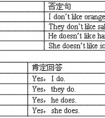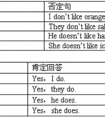Read and judge.读一读,判断,正确的画(√),不正确的画(×)。( )1.I write a letter on paper.( )2. You can put the stamp in the top, left corner.( )3.I don't n-五年级英语
(4 ) 在------之内 What are you going to do in 20 years?
(5 ) 在------(早上、下午、晚上)
I do morning exercises in the morning every day.
I usually play basketball in the afternoon.
I often do my homework in the evening.
3. under
在------底下 There is a ball under the bed.
4. near
在------附近 There is a book shop near our school.
5. in front of
在------前面 A boy is standing in front of the house.
6. beside
在------旁边 A football is beside the door.
7. next to
紧挨着 There is a bus station next to No. 13 Middle School.
8. over
在------正上方 A bridge is over the river.
9. on the left
在------左边 The bookstore is on the left.
10. on the right
在------右边 The hospital is on the right.
11. before
在……之前 Mike sits before me.
12. after
在------以后 He went home after school.
13. in the middle
在------中间 The road is in the middle.
14. at
(1) 在------(小地方) I am at school today. I was at home yesterday.
(2) 在------(点钟) I usually go to school at 8:00 am.
(3)看一看 Look at the blackboard.
(4) 在中午 at noon
15. behind
在------后面 There is a broom behind the door.
16.for
(1)给 This present is for you.
(2)为了 Thank you for telling me the way to the zoo.
(3)作为 We have some chips and hamburgers for lunch.
17.to
(1) 到 Take your sport shoes to the P.E class.
(2) 致 Happy birthday to you. Give it to your friend.
18. from
来自 I am from China. = I come from China.
19. from --- to
从------到------ Line up from shorter to taller.
We have class from Monday to Friday.
20. of
------的 He is a student of Kama School.
21. by
(1)在------之前 We must be at home by 6 o’clock.
(2)乘------交通工具 People can go to the moon by spaceship.
I go to school by bus.
22.with
(1) 用 I write a letter with a pen.
(2) 和------一起 He went to Shenzhen with his parents.
23. between
在------与------之间 There is a football match between Class One and Class Three.
24. into
到------里 Sharks can dive into the deep cold water.
25. like
(1)象------ The twins are like their father.
(2)长相------怎样? What’s he like?
26. up
向上 Put up your hands if you have any questions.
27. down
向下 Put down all the books here.
28. about
(1) 大约;关于 It’s about 6:00 now.
(2) ------怎么样? What about---? How about---?
29. what for
为什么 But what for?
早、午、晚要用in,at黎明、午夜、点与分。
年、月、年月、季节、周,阳光、灯、影、衣、冒in。
将来时态in...以后,小处at大处in。
有形with无形by,语言、单位、材料in。
特征、方面与方式,心情成语惯用in。
介词at和to表方向,攻击、位置、恶、善分。
日子、日期、年月日,星期加上早、午、晚,
收音、农场、值日on,关于、基础、靠、著论。
着、罢、出售、偷、公、假,故意、支付、相反,准。
特定时日和"一……就",on后常接动名词。
年、月、日加早、午、晚,of之前on代in。
步行、驴、马、玩笑on,cab,carriage则用in。
at山脚、门口、在当前,速、温、日落、价、核心。
工具、和、同随with,具有、独立、就、原因。
就……来说宾译主,对、有、方状、表细分。
海、陆、空、车、偶、被by,单数、人类know to man。
this、that、tomorrow,yesterday,next、last、one。
接年、月、季、星期、周,介词省略已习惯。
over、under正上下,above、below则不然,
若与数量词连用,混合使用亦无关。
beyond超出、无、不能,against靠着,对与反。
besides,except分内外,among之内along沿。
同类比较except,加for异类记心间。
原状because of,、 owing to、 due to表语形容词
under后接修、建中,of、from物、化分。
before、after表一点, ago、later表一段。
before能接完成时,ago过去极有限。
since以来during间,since时态多变换。
与之相比beside,除了last but one。
复不定for、找、价、原,对、给、段、去、为、作、赞。
快到、对、向towards,工、学、军、城、北、上、南。
but for否定用虚拟,复合介词待后言。
ing型由于鉴,除了除外与包合。
之后、关于、在......方面,有关介词须记全。
in内to外表位置,山、水、国界to在前。
考点名称:名词
- 名词:
是表示人、动物、地点、物品以及抽象概念的词。 名词分类:
一、根据其词汇意义,可分为专有名词和普通名词,
1.专有名词:
指表示人、地方、机构、组织等的专有名称。具体说来,它包括人名、地名、月份、星期、节日、书名、电影名以及某些抽象名词等。如:
Jim 吉姆
China 中国
Mr. Smith 史密斯先生
July 七月
Friday 星期五
the Yellow River 黄河
Christmas 圣诞节
English 英语
A Tale of Two Cities 《双城记》
注:专有名词的首字母通常要大写。若是专名名词词组,则其中每个单词的首字母要大写;若是缩略词,则通常每个字母都大写;
称呼家人的 mum, dad, father, mother 等有时也可小写。
2.普通名词:
指表示一类人或东西或抽象概念的名词。
具体地说,它可分为个体名词、集合名词、物质名词和抽象名词。
其中个体名词表示某类人或东西中的个体,如girl(女孩)等;
集体名词表示若干个个体组成的集合体,如 audience(观众,听众)等;
物质名词表示无法分为个体的实物,如water(水)等;
抽象名词表示动作、状态、品质、感情等抽象概念,如work(工作),happiness(幸福)等。
普通名词又可分为个体名词、集体名词、物质名词、抽象名词;
二、名词根据能否用数字计算标准,又可以分为可数名词和不可数名词。
一般说来,个体名词和大部分集合名词是可数的;
而专有名词、物质名词、抽象名词以及小部分集合名词则通常是不可数的。
但是这种区分只是大致的,原则性的,并不是绝对的。比如,在通常情况下专有名词具有“独一无二”性,因此它通常没有复数形式,即不可数。
但是,专有名词的独一无二性有时是相对的,随着范围的扩大,这种独一无二性便会受到破坏。
如在一个星期(week)内,只有一个星期六(Saturday), 一个星期日(Sunday)等,但是在一个月中甚至一年中,便有多个星期六,多个星期日了。
又如,在一个小范围内,可能只有一个 Henry,但在一个较大的范围内则可能有多个 Henry, 因此我们有时会见到类似以下这样的句子:
We have spent many happy Sundays there. 我们在那儿度过了许多个愉快的星期日。
There are five Henrys in our school. 我们学校有五个亨利。
三、另外,物质名词在通常情况下不能分为个体,所以它通常是不可数的。
但是,在某些特殊情况下(如表示种类等),有些物质名词也可以连用不定冠词或用复数形式。如:
Will you have tea or coffee? 你喝茶还是喝咖啡?
Two coffees, please! 请来两杯咖啡!
再如,抽象名词是表示事物性质、行为、状态、感情等抽象概念的,因此它通常是不可数的。
但是,有时抽象名词也可转化为具体名词,表示具有某种性质的人、事物或行为(可数)。如:
She did this out of kindness. 她这样做是出于好心。(指抽象意义)
He has done me many kindnesses. 他对我很关心。(指好意的行为)名词复数的变化规律:
1. 名词复数的规则变化
(1) 一般情况加词尾 -s,如 book / books, desk / desks等。
其读音规则是在清辅音后读[s],在元音和浊辅音后读[z]。
(2) 以 s, x, z, sh, ch 等结尾的名词,通常加词尾 -es:bus / buses, box / boxes, dish / dishes等。
(3) 以y 结尾的名词,其复数构成要分两种情况:
以“辅音字母+y”结尾的名词,将 y 改为 ies;
以“元音字母+y”结尾的名词,直接加词尾-s:city / cities, toy / toys, holiday / holidays 等。2. 复数规则变化的几点说明
(1) 以 ch 结尾的名词变复数时加词尾-es,指的是 ch 读音为[tF]时;
若ch的读音为[k],则其复数应加词尾-s,如 stomach[tstQmEk]是 stomachs,而不是 stomaches。
- 最新内容
- 相关内容
- 网友推荐
- 图文推荐
| [家长教育] 孩子为什么会和父母感情疏离? (2019-07-14) |
| [教师分享] 给远方姐姐的一封信 (2018-11-07) |
| [教师分享] 伸缩门 (2018-11-07) |
| [教师分享] 回家乡 (2018-11-07) |
| [教师分享] 是风味也是人间 (2018-11-07) |
| [教师分享] 一句格言的启示 (2018-11-07) |
| [教师分享] 无规矩不成方圆 (2018-11-07) |
| [教师分享] 第十届全国教育名家论坛有感(二) (2018-11-07) |
| [教师分享] 贪玩的小狗 (2018-11-07) |
| [教师分享] 未命名文章 (2018-11-07) |


![Where is my bag? It's _____________the desk. [ ]A. inB. behindC. on-五年级英语](http://www.00-edu.com/d/file/ks/4/1/44/2019-08-20/small3591750882d019139d20d416cb80f64f1566236486.jpg)
![Where's my pen? [ ]A. It's in the desk.B. It's under the desk.C. It's on the desk.-四年级英语](http://www.00-edu.com/d/file/ks/4/1/44/2019-08-20/small4157828d9d6bc1a02bdbdd4d3ffccde61566236790.jpg)

![I can call you _____________ the phone.[ ]A. inB. atC. onD. of-六年级英语](http://www.00-edu.com/d/file/ks/4/1/44/2019-08-20/small17adfe158040ebb20380cac1c81e7ec81566232881.jpg)
